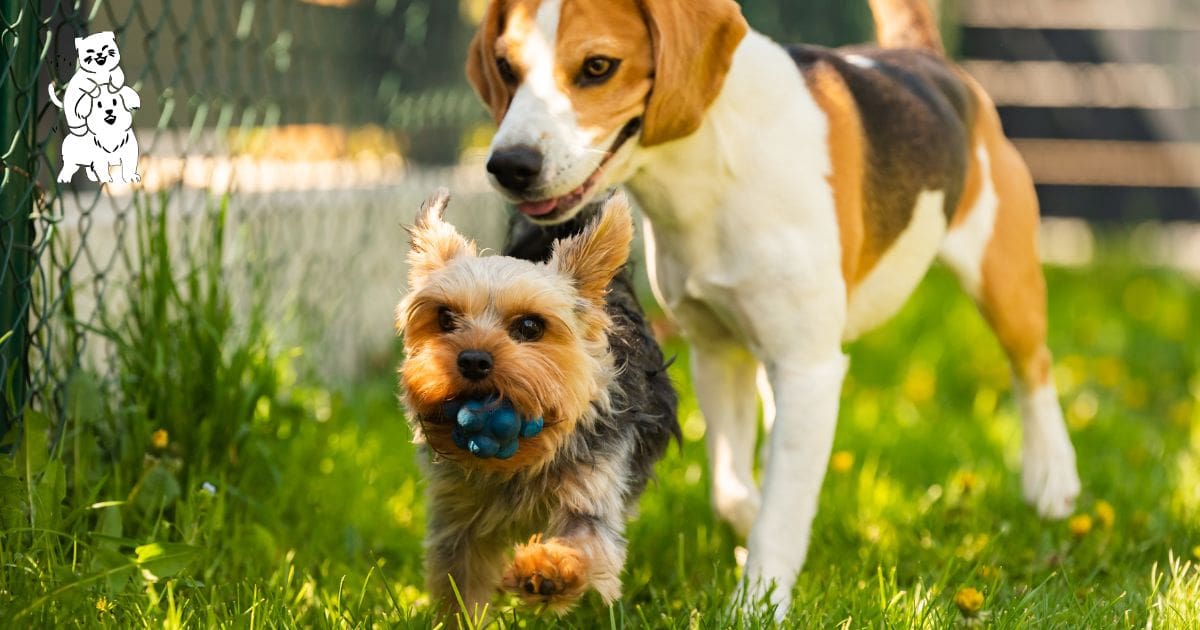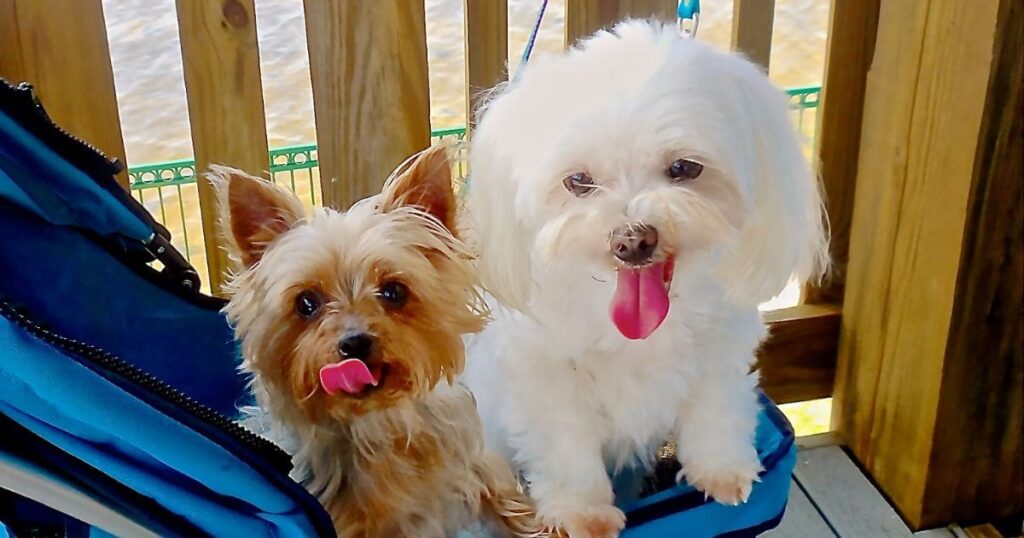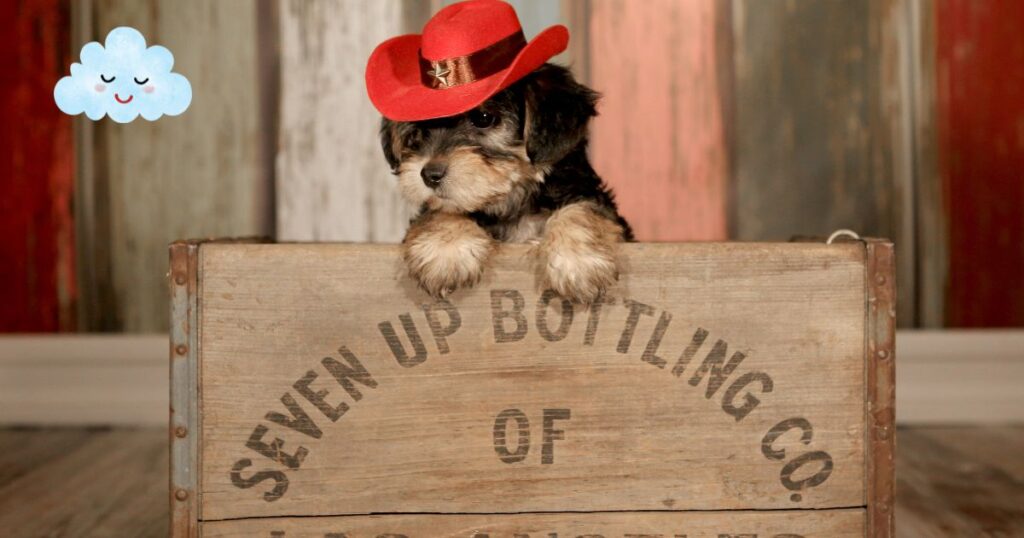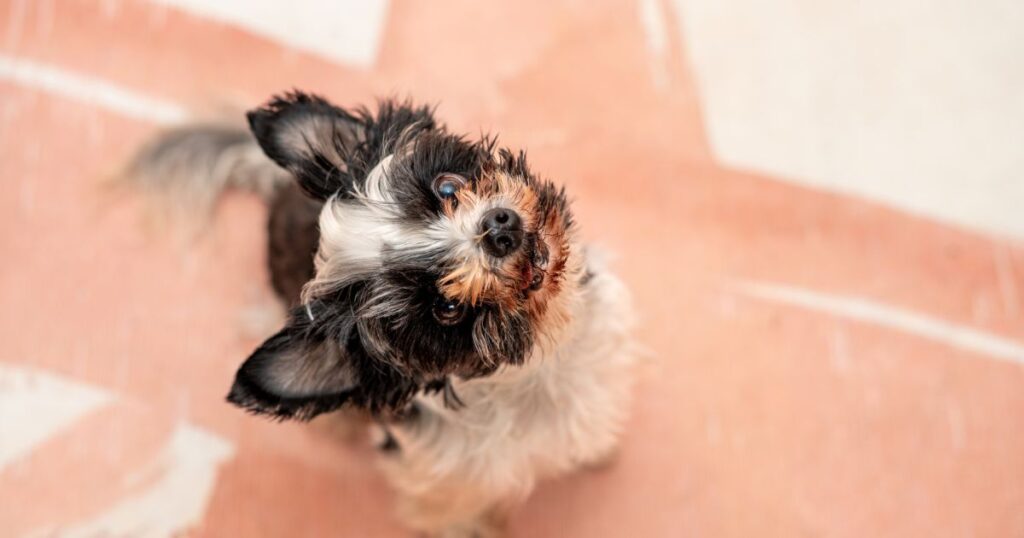Are Yorkies Good With Other Dogs? [A Guide to Early Socialization]

Welcome to our comprehensive guide on fostering balanced relationships between Yorkshire Terriers (Yorkies) and other dogs. As proud Yorkie enthusiasts, we understand the significance of nurturing positive social interactions in our furry companions. In this guide we will explore an “are yorkies good with other dogs?”
Whether you’re a seasoned Yorkie owner, a passionate breeder, or a dedicated veterinary professional, this guide will equip you with valuable insights into ensuring that your beloved Yorkie thrives in the company of other dogs.
Yorkshire Terriers have captured the hearts of many as a beloved companion breed. Their charming qualities and unique appearance make them a sought-after choice for dog lovers worldwide. However, one aspect that deserves special attention is their social behavior with other dogs.
As responsible pet owners, we recognize the importance of comprehending our Yorkies’ temperament and tendencies, especially when introducing them to their canine counterparts.
Understanding a Yorkie’s social behavior with other dogs is essential for creating a balanced environment. Whether you are considering adding another dog to your household or planning Play dates at the park, knowing how your Yorkie may react can enhance the overall experience for both your pet and yourself.
Join us as we delve into the aspects of Yorkies’ interactions, exploring their temperament, compatibility factors, and practical tips for successful introductions with other dogs.
Role of Yorkies’ Temperament
Investigating the temperament of Yorkshire Terriers (Yorkies) shows a fascinating combination of features that attract them to their owners and captivate the interest of dog enthusiasts. This exploration uncovers the traits that make Yorkies excellent companions in the canine world.
Yorkies have Loyal Nature
Yorkies are renowned for their loyalty and affectionate nature. Their deep bond with their human companions often translates into an eagerness to please and a desire for close physical proximity.
This loyalty extends to their interactions with other dogs, making them delightful playmates when their social compatibility aligns.
They are Spirited in Nature
Yorkies’ small size adds a special dimension to their encounters with larger canines. Their small size, often weighing in at just a few pounds, might appear challenging when encountering larger canine companions. Yorkies possess a spirit that overshadows their size.
While Yorkies may not match the physical strength of larger breeds, they compensate with confidence and determination. This often results in spirited play and engaging interactions.
Nevertheless, as responsible Yorkie enthusiasts, it’s essential to monitor these interactions to ensure the safety and comfort of all dogs involved.

Understanding Yorkies’ temperament is the key to encouraging harmonious relationships with other dogs. Their loyalty and affection provide a solid foundation for positive interactions, while their small size can influence the dynamics of play.
Whether you’re introducing your Yorkie to a fellow small breed or a larger counterpart, taking their unique personality into account sets the stage for successful interactions.
Compatibility Factors of Yorkies and Other Dogs
In terms of Yorkie’s interaction with other dogs, it is evident that several factors influence their compatibility. Recognizing and understanding these elements is crucial to promoting positive relationships and avoiding unnecessary conflicts
Matching Temperament
One of the cornerstones of successful interactions between Yorkies and other dogs is temperament compatibility. Just as humans are drawn to individuals with similar personalities, dogs tend to gravitate toward those who share their energy levels, play styles, and social preferences.
When introducing your Yorkie to a new canine friend, observe their initial interactions closely. Look for signs of mutual interest, such as playful behavior, tail wagging, and relaxed body language.
Early Socialization and Training
The early stages of a Yorkie’s life play a pivotal role in shaping their behavior towards other dogs. Introducing your Yorkie to a variety of canine companions during their puppyhood exposes them to diverse personalities and helps develop their social skills.
Proper socialization sets the foundation for positive interactions in the future, making it easier for Yorkies to adapt to various playmates and settings.
Training also significantly contributes to a Yorkie’s ability to get along with other dogs. Basic obedience commands and cues not only establish your authority as the owner but also create a sense of security for your Yorkie.
When your Yorkie responds promptly to your commands, it reinforces their understanding of acceptable behavior, making interactions with other dogs smoother and more controlled.
A Safe Environment
Another vital consideration in fostering compatibility is the environment in which interactions take place. Ensuring a controlled setting reduces the chances of unnecessary stress or conflict.

When introducing your Yorkie to a new dog, choose a neutral location, preferably away from your home territory. This helps prevent territorial disputes and minimizes the potential for aggressive behavior.
By addressing these compatibility factors, you pave the way for joyful and harmonious interactions between your Yorkie and other dogs.
Signs of Positive Compatibility
Recognizing whether your Yorkshire Terrier (Yorkie) is enjoying a harmonious interaction with another dog is essential for fostering positive relationships. Yorkie owners, breeders, or enthusiasts need to be aware of their Yorkie’s body language and behavior. These things guide you in ensuring their social interactions are joyous and conflict-free.
Positive Behaviors
When your Yorkie is getting along well with another dog, certain behaviors serve as satisfying indicators of compatibility. These include:
- Playfulness: A Yorkie who is genuinely enjoying the company of another dog often engages in playful antics. Look for enthusiastic tail wagging, chasing, and even rolling over during play.
- Relaxed Body Language: A joyful Yorkie exhibits a relaxed posture. Their ears are up, and their tail is held in a neutral position, conveying comfort and ease.
- Shared Activities: When your Yorkie and another dog participate in shared activities, like exploring together or taking turns during play, it signals a positive connection.
Warning Signs
Conversely, it’s crucial to be aware of signs that may indicate discomfort or potential aggression. These warning signs include:
- Raised Fur: If your Yorkie’s fur stands on end along its back, it could signify tension or fear, indicating the need to intervene.
- Growling or Snapping: Audible growls or snaps should never be ignored. These behaviors suggest that your Yorkie is uncomfortable or feels threatened.
- Stiff Body Language: A Yorkie with a stiff, rigid posture might be on edge. This could escalate into aggression if not addressed promptly.
To encourage positive interactions, create an environment where your Yorkie can thrive. Facilitate introductions on neutral ground, and monitor their interactions closely. If you notice friendly behaviors, praise and reward both dogs, reinforcing their positive connection.
Potential Challenges and How to Overcome Them
Territorial Behavior
One potential challenge that can arise when introducing Yorkies to other dogs is territorial behavior. Yorkies, despite their small size, possess a natural instinct to protect their living space.

When faced with a new canine companion entering their territory, Yorkies might exhibit signs of defensiveness or even aggression.
Overcoming Territorial Behavior
To overcome territorial behavior, it’s crucial to manage introductions carefully. Begin by choosing a neutral location for the initial meeting, which reduces the Yorkie’s sense of ownership over the area.
Gradually introduce the dogs while maintaining calm and positive behavior. Praise and reward both dogs for displaying calm behavior, promoting a sense of safety and trust.
Jealousy and Attention-Seeking
Yorkies are known for their affectionate nature and desire for close human companionship. When a new dog enters the household, jealousy can arise if your Yorkie feels their attention is being divided. This might manifest in attention-seeking behaviors or even attempts to assert dominance.
Addressing Jealousy
To address jealousy, ensure that your Yorkie receives consistent attention and affection. Engage in activities that involve both dogs, such as play sessions or training exercises.
Gradually increase the time they spend together, allowing them to become comfortable with each other’s presence. Providing separate spaces for each dog, along with individual attention, can help mitigate feelings of rivalry.
Positive Reinforcement
Overcoming challenges requires a commitment to positive reinforcement and consistency. Patiently working with your Yorkie and their new canine companion fosters a sense of security and belonging.
Remember that Yorkies are sensitive to changes in their environment, so gradual introductions and the establishment of routines play a pivotal role in their adjustment.
Tips for Introducing Yorkies to New Dogs
Introducing your beloved Yorkshire Terrier (Yorkie) to a new canine companion can be an exciting but delicate endeavor. Ensuring a smooth and positive introduction lays the foundation for a harmonious relationship between your Yorkie and the new dog.

Step-by-Step Guide
Here is a step-by-step guide to facilitate a successful introduction between your Yorkie and a new dog:
- Choose a Neutral Location: Opt for a neutral territory, such as a park, where neither Yorkie nor the new dog has established ownership. This reduces territorial instincts and minimizes potential conflicts.
- Leash Both Dogs: Keep both dogs on leashes to maintain control over the situation. This prevents sudden movements and helps you intervene if needed.
- Allow Sniffing: Dogs rely heavily on their sense of smell. Allow both dogs to approach each other at their own pace, sniffing and investigating without pressure.
- Monitor Body Language: Observe their body language closely. Look for signs of curiosity, such as wagging tails and relaxed postures. Steer clear of any tense or aggressive behavior.
- Positive Reinforcement: Praise and reward both dogs for calm and friendly behavior. Verbal encouragement and treats create positive associations with each other’s presence.
- Short Meetings at the Initial Level: Keep the initial meetings short and positive. Gradually increase the duration of interactions as both dogs become more comfortable with each other.
- Supervised Play: Once initial introductions go smoothly, allow them to engage in supervised play. Playful behaviors, like chasing or rolling over, indicate a positive connection.
- Separate Spaces: As they adapt to each other’s presence, provide separate resting spaces for each dog to ensure they have their own safe haven.
- Gradual Integration: Slowly integrate the new dog into your Yorkie’s daily routines. This could involve feeding, walks, and playtime together.

Ensure Safety
Emphasize the importance of patience and safety throughout the introduction process. Sudden movements or overwhelming situations can trigger fear or stress in your Yorkie. Always be prepared to intervene if either dog shows signs of discomfort or aggression.
By following these guidelines, you contribute to a positive and comfortable environment for both your Yorkie and their new companion.
Yorkies’ Compatibility with Different Dog Breeds
While Yorkies have their own unique personalities, it’s important to consider their compatibility with other dog breeds. By understanding which breeds your Yorkie may get along well with, you can ensure a harmonious and joyful environment for all involved.
Compatible Dog Breeds
Certain dog breeds are more likely to share positive interactions and friendships with Yorkies. It is important to note that individual temperament can vary within any breed, so introductions should always be approached with caution and patience. Here are some dog breeds that tend to be more compatible with Yorkies:
- Maltese: Similar in size and temperament, Maltese dogs often form close bonds with Yorkies. Their affectionate nature and gentle demeanor create a conducive atmosphere for companionship.
- Chihuahua: Despite differences in size, Chihuahuas and Yorkies can create strong connections due to their lively personalities and mutual playfulness.
- Pomeranian: Both Pomeranians and Yorkies share similar personalities. Their energy levels align well, making playtime and companionship enjoyable for both.
- Cavalier King Charles Spaniel: This breed’s friendly and gentle nature complements the sociable temperament of Yorkies, fostering a positive dynamic.

Special Considerations
While some dog breeds naturally align with Yorkies, it is crucial to exercise caution and gradual introductions when encountering breeds with differing temperaments.
Breeds that are particularly larger or more assertive might require extra attention during the initial stages of interaction. Monitoring body language and facilitating controlled play is key to fostering a successful relationship.
As you explore potential companions for your Yorkie, remember that individual preferences play a role. Just as humans have diverse friendships, so do dogs. Observing your Yorkie’s reactions during meet-and-greets can provide valuable insights into their compatibility with other breeds.
Why Socialization and Training is Important?
Introducing your Yorkie to a variety of dogs from a young age is pivotal to their development. Early socialization exposes them to diverse personalities, helping them become more adaptable and confident in different situations.
Consider engaging in supervised play dates with other friendly and well-behaved dogs, allowing your Yorkie to experience positive interactions.
Training for Positive Interactions
Training plays a significant role in shaping your Yorkie’s behavior around other dogs. By incorporating positive reinforcement techniques, you can encourage desirable behaviors while discouraging unwanted reactions. Here are some training tips to promote harmonious interactions:
- Reward Desired Behavior: Whenever your Yorkie displays friendly behavior around other dogs, reward them with treats, praise, or affection. This reinforces their positive actions.
- Redirect Unwanted Behavior: If your Yorkie shows signs of aggression or discomfort, gently redirect their attention to a more positive activity. This prevents escalating tensions.
- Gradual Exposure: When introducing your Yorkie to new dogs, start with calm and controlled environments. Gradually increase the complexity of interactions as their confidence grows.
Creating a Safe Environment
A controlled and safe environment is essential during socialization and training. Ensure that interactions occur in neutral spaces where neither dog feels territorial. Be vigilant about body language – a wagging tail and relaxed posture signal a positive encounter, while tense body language might indicate unease.
Embracing socialization and training as ongoing processes empowers your Yorkie with invaluable skills. Their ability to communicate effectively with other dogs and interpret their cues enhances their overall quality of life. Ultimately, a well-socialized Yorkie contributes to a harmonious atmosphere within your multi-pet household.
Special Considerations for Tiny Yorkies
Safety is Crucial for Their Size
Due to their petite size, it’s important to exercise caution when introducing tiny Yorkies to larger dogs. Larger dogs, though usually well-meaning, might unintentionally overwhelm or even harm a small Yorkie.

When facilitating interactions, opt for dogs that have a gentle and patient nature. This helps mitigate the risk of any accidents or anxiety-inducing scenarios for your tiny companion.
Matching Playmates
When considering suitable playmates for your Yorkie, focus on dogs that share a similar energy level and play style. Look for breeds that are known for their gentle nature and compatibility with smaller dogs.
Beagle, Cavalier King Charles Spaniel, and Pomeranian are examples of breeds that often make great companions for Yorkies. Observe how the dogs interact before encouraging prolonged playtime.
Supervised Interactions and Play
Supervision is paramount when allowing your tiny Yorkie to interact with larger dogs. Initially, keep interactions brief and controlled to assess how well they’re getting along.
Gradually increase the duration of playtime as you observe positive behaviors and comfort levels between the dogs.
Look for Alternative Activities
If interactions with larger dogs seem overwhelming for your Yorkie, consider engaging in activities that are more tailored to their size and preferences.

Small dog playgroups, where the participants are of similar size, can provide a safe space for them to socialize and play without the risk of being overshadowed.
Frequently Asked Questions (FAQs)
Do Yorkies enjoy playing with other dogs?
Yorkies generally enjoy playtime with other dogs, especially those that are similar in size and energy level. Their playful nature and lively demeanor often lead to delightful interactions with canine companions.
However, it’s important to supervise play to ensure it remains positive and safe. Keep in mind that individual Yorkies may have varying preferences for play, so observe their reactions and tailor play dates accordingly.
It’s also worth considering whether Yorkies get along with big dogs. While small in size, Yorkies can have amiable relationships with larger dogs if introduced properly. Socialization and positive experiences play a crucial role in determining their comfort level around bigger canine friends.
Can Yorkies coexist with cats and other animals?
Yes, Yorkies can coexist with cats and other animals if introduced and socialized properly. Yorkies can thrive in multi-pet households, especially when introduced to other pets from a young age. Proper training and supervision are essential for maintaining a peaceful coexistence among different animals.
Early exposure to other pets and gradual introductions can help foster positive relationships. However, each Yorkie and pet’s personality differs, so it’s essential to monitor interactions and provide a safe environment. Respect their boundaries and consider their comfort levels during introductions.
How do Yorkies handle rough play with other dogs?
Yorkies are generally small and delicate, which means rough play with larger or more boisterous dogs can be overwhelming or even risky.
It is advisable to facilitate Playdates with dogs that have a gentle playstyle and are compatible in size. If rough play occurs, monitor closely and intervene if necessary to prevent stress or injury to your Yorkie.
Do Yorkies prefer companionship from other dogs?
Yorkies have a social nature and often enjoy the company of other dogs. However, their preference for companionship can vary. Some Yorkies may be more independent and content with human interaction, while others thrive with a doggie playmate.
Observing your Yorkie’s behavior and responsiveness to other dogs can help you gauge their companionship preferences.
Can Yorkies coexist peacefully with other dogs?
Yes, Yorkies can coexist peacefully with other dogs, but successful coexistence depends on factors such as temperament, socialization, and introductions. When introducing Yorkies to new dogs, ensure the environment is controlled and positive.
Gradually increase exposure and watch for signs of compatibility. Some Yorkies may be more territorial, so patience and proper introductions are key.
Can Yorkies be aggressive towards other dogs?
While Yorkies are generally not known for aggressive behavior, individual personality and experiences play a role. Aggression can be a response to fear, stress, or poor socialization.
Early and positive socialization, along with proper training, can significantly reduce the likelihood of aggression. If you notice aggressive behavior, consult a professional trainer or behaviorist for guidance.
Summing Up
Fostering positive relationships between Yorkshire Terriers and other dogs requires patience, early socialization, and proactive training. Understanding their unique temperament and body language is vital for harmonious interactions.
Whether they enjoy playful romps or peaceful coexistence, nurturing their compatibility with different breeds enhances their overall well-being. By following these guidelines, you can ensure that your beloved Yorkie thrives in the company of fellow canines.



